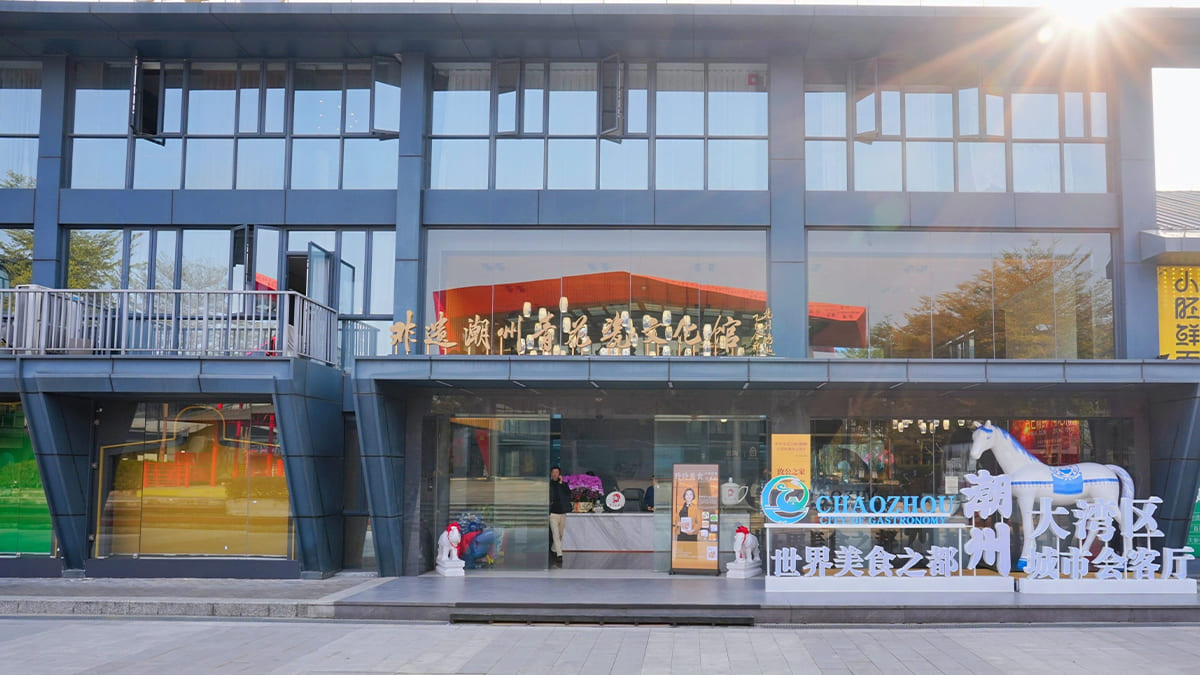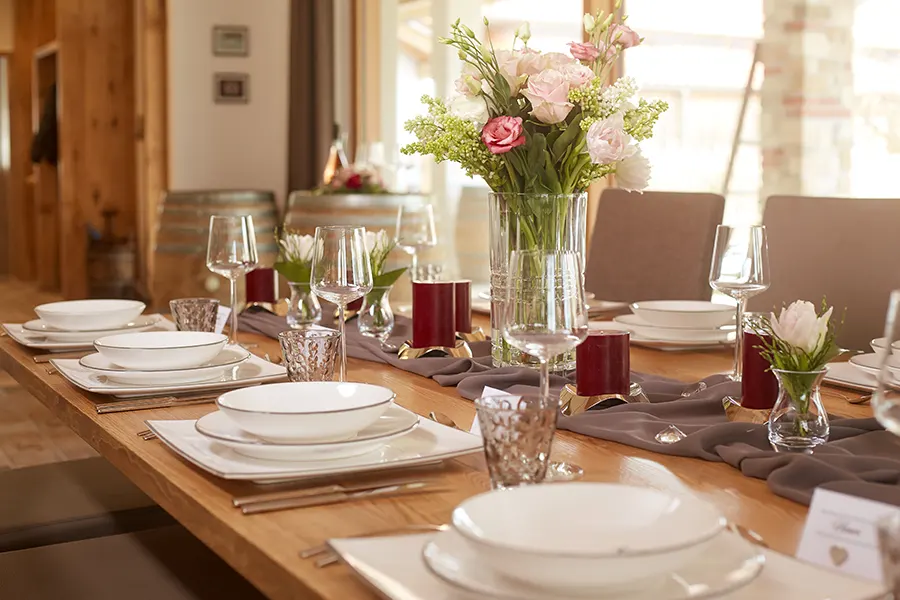
Seleccionar la vajilla adecuada para su restaurante u hotel es una decisión crucial que puede afectar en gran medida la experiencia y la presentación gastronómica general.. La vajilla que elija refleja la imagen de su establecimiento, Mejora el ambiente, y contribuye al disfrute de la comida. Por lo tanto, Es esencial considerar cuidadosamente varios factores antes de tomar una decisión final..
Consideraciones para restaurantes de restaurantes o hoteles
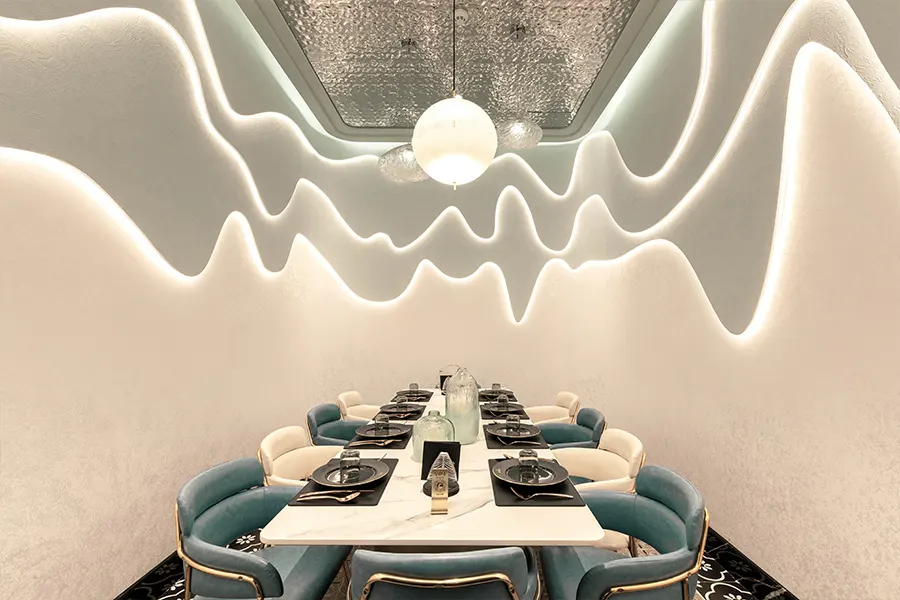
A. Marca y estilo
Al elegir la vajilla, Es esencial considerar qué tan bien refleja la imagen deseada y la atmósfera de su establecimiento.. La vajilla debe ser consistente con el tema general o la decoración del restaurante o hotel., Creando una experiencia gastronómica cohesiva y memorable.
B. Durabilidad y longevidad
Invertir en vajillas de alta calidad es una buena opción para soportar el uso pesado en un restaurante o hotel. El vajilla debería poder resistir el chipp, rotura, y rascarse, Asegurar su longevidad y minimizar la necesidad de reemplazos frecuentes.
C. Funcionalidad y practicidad
Diferentes platos y cocinas requieren tipos específicos de vajillas. Por lo tanto, Es crucial elegir la vajilla que se adapte a los diferentes platos que ofrece. Además, Teniendo en cuenta la capacidad de apilamiento y las propiedades de ahorro de espacio pueden optimizar el almacenamiento y garantizar una operación eficiente en la cocina.
D. Facilidad de limpieza y mantenimiento
El lavado y la exposición frecuentes al calor son inevitables para la vajilla utilizada en un restaurante u hotel. Por lo tanto, Es crucial elegir la vajilla que pueda resistir estas condiciones sin comprometer su calidad o apariencia. La compatibilidad con los lavavajillas comerciales también es un factor importante a considerar para los procesos de limpieza suaves y eficientes..
mi. Regulaciones de seguridad y salud
Adherirse a los estándares de seguridad es de suma importancia al seleccionar la vajilla para un restaurante o hotel. Es crucial evaluar los posibles daños por productos químicos o materiales utilizados en la fabricación de la vajilla para garantizar la seguridad y el bienestar de sus invitados..
F. Consideraciones de costo y presupuesto
Si bien la calidad es esencial, También es necesario equilibrarlo con asequibilidad. Lograr un equilibrio entre calidad y costo es crucial para garantizar el retorno de la inversión a largo plazo en la vajilla. Evaluar la durabilidad y la vida útil esperada del vajilla puede ayudar a determinar su valor por dinero.
Diferentes tipos de vajillas
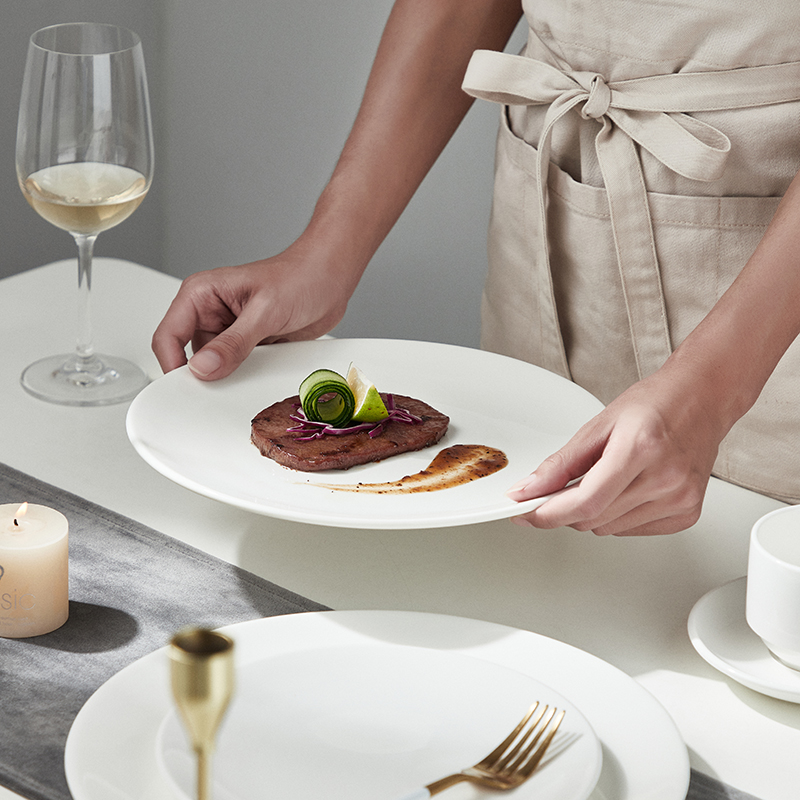
A. Cerámico
Vajilla de cerámica es apreciado por sus texturas y patrones únicos. Proporciona una excelente retención de calor y a menudo viene con opciones seguras de microondas., Agregar conveniencia a la experiencia gastronómica.
B. Porcelana porcelana
Vajilla de porcelana porcelana es una opción versátil y elegante. Es conocido por sus excelentes propiedades de retención de calor., Asegurar que la comida permanezca caliente por períodos más largos. Su delicada apariencia agrega un toque de sofisticación a la configuración de la tabla.
C. Gres
Stoneware ofrece una estética rústica y terrosa, Perfecto para crear un ambiente acogedor y cálido. Es altamente resistente a los rasguños y altas temperaturas, haciéndolo ideal para usar en la cocina y en la mesa del comedor.
D. Porcelana blanca y translúcida
Vajilla de porcelana de huesos es famoso por su apariencia delicada y translúcida. A pesar de su delicado aspecto, Ofrece durabilidad excepcional y resistencia a los chips. Exuda un aire de elegancia, convirtiéndolo en una opción popular para restaurantes y hoteles de alta gama.
mi. Silicona
La vajilla de silicona es flexible y duradera, haciéndolo adecuado para niños y personas que prefieren un manejo fácil. Sus colores vibrantes y diseños innovadores contribuyen a una experiencia gastronómica divertida y juguetona..
Hacer una vajilla con las características del plato puede mejorar en gran medida su experiencia de presentación y sabor. Por ejemplo, El uso de porcelana por China para creaciones culinarias delicadas o el uso de gres para comidas abundantes puede crear una experiencia gastronómica armoniosa.
Colores y patrones
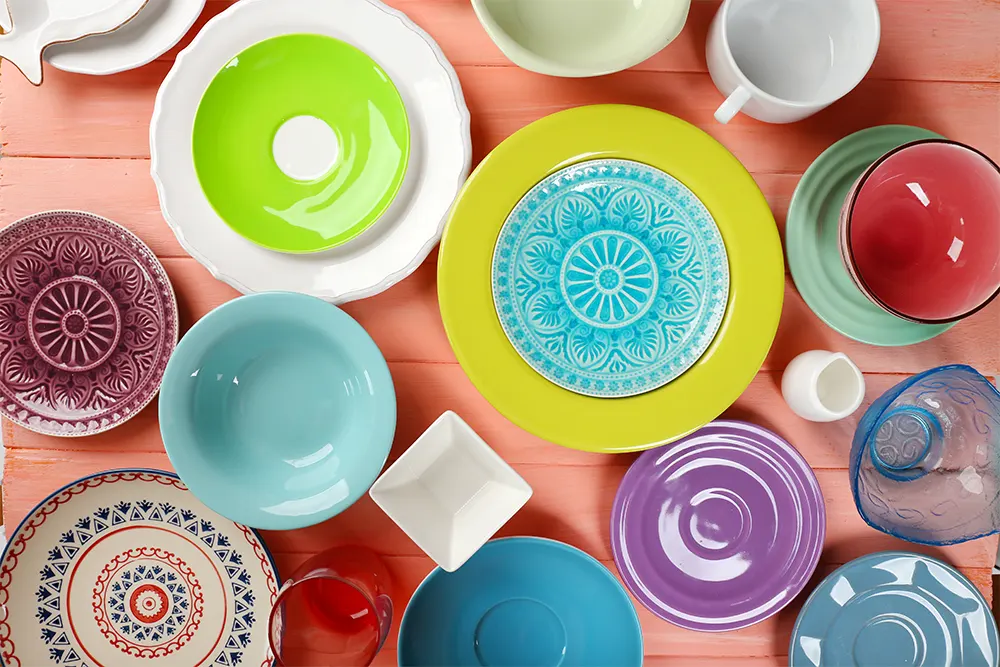
A. Tonos neutrales y clásicos
Optar por tonos neutros y clásicos crea una elegancia y versatilidad atemporales en la configuración general de la tabla. Crea un ambiente tranquilo y sofisticado, permitiendo que el enfoque esté en la comida en sí.
B. Colores audaces y vibrantes
La incorporación de colores audaces y vibrantes en la vajilla agrega personalidad y emoción a la mesa.. Refleja la energía de la marca o las influencias de diferentes culturas., Hacer que la experiencia gastronómica sea única y memorable.
C. Patrones y diseños
Los patrones y diseños únicos en la vajilla pueden agregar interés visual a la mesa general. Hacer coincidir los patrones y diseños con el tema o la decoración del establecimiento puede crear un ambiente cohesivo y estéticamente agradable..
Tamaños y formas
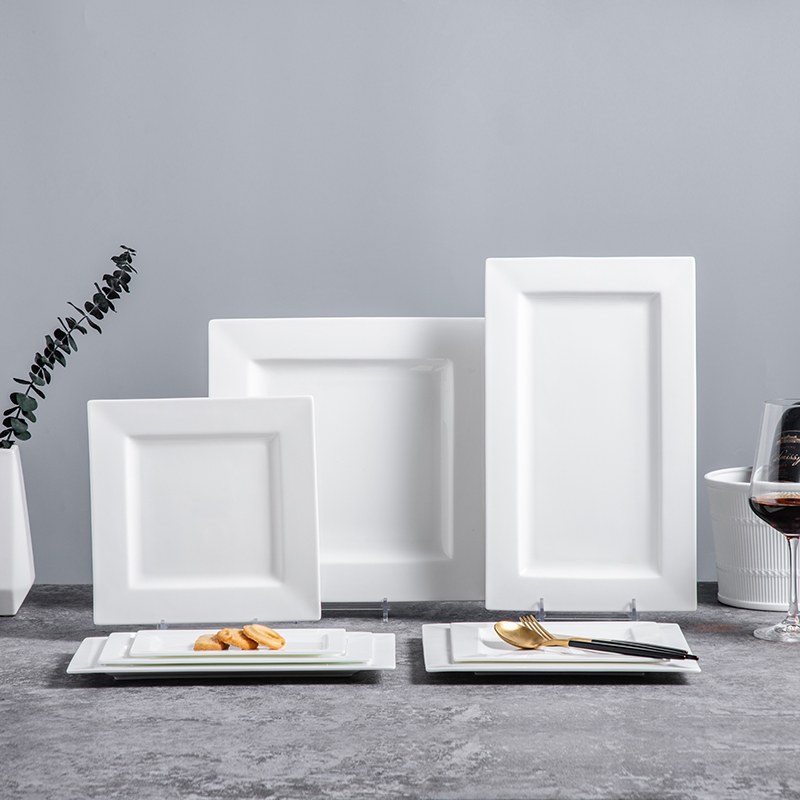
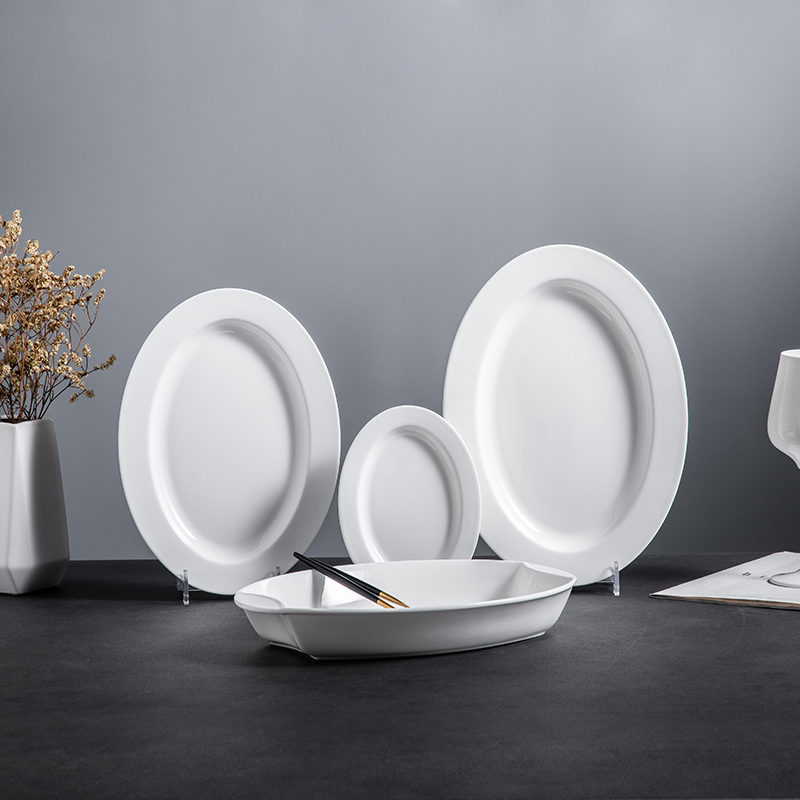
A. Platos y platos
Considerar varios tamaños de placas y platos es esencial para acomodar diferentes cursos. Explorando cuadrado, rectangular, y las opciones redondas pueden agregar versatilidad a la configuración de la tabla, permitiendo presentaciones creativas de placas.
B. Tazones y tazas de sopa
Determinar la forma y la profundidad ideales del tazón es crucial para servir sopas, guisos, o ensaladas. Evaluar la capacidad de la apilamiento y la facilidad de uso puede facilitar un servicio eficiente y conveniente en un ambiente de restaurante o hotel ocupado.
C. Cubiertas y cubiertos
Elegir tamaños y diseños de utensilios apropiados es vital para los huéspedes’ conveniencia y comodidad. Evaluar el agarre y el diseño ergonómico de las cubiertas pueden mejorar en gran medida la experiencia gastronómica.
Consideraciones especiales para servir Ware
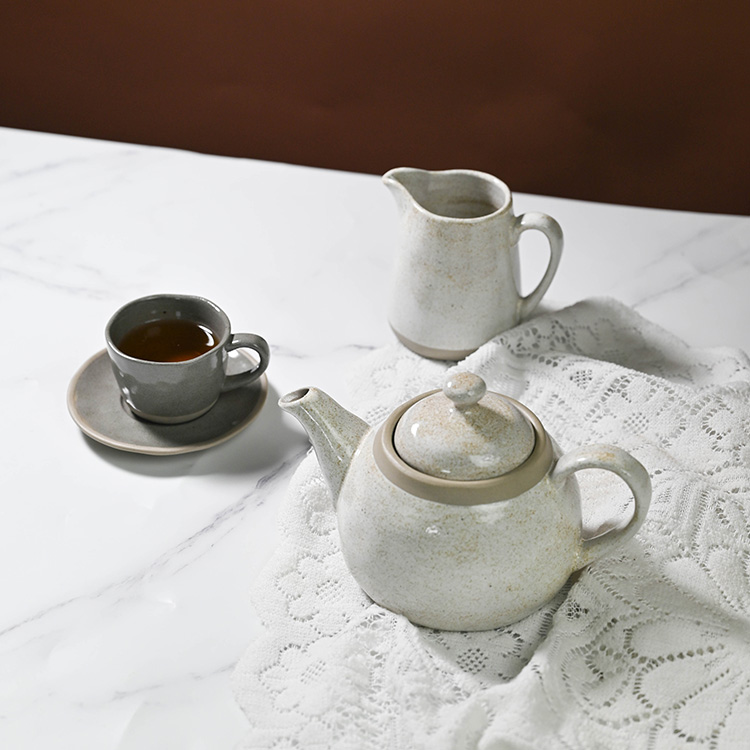
A. Bandejas para servir
Las bandejas para servir vienen en diferentes formas, tamaños, y materiales. Es importante explorar estas opciones para garantizar la durabilidad y el diseño ergonómico., Hacer que el trabajo del personal del servicio sea más eficiente y garantizar una experiencia gastronómica agradable para los invitados.
B. Cristalería de bebidas
Ofreciendo una variedad de tipos de vidrio para diferentes bebidas, como copas de vino, gafas de cóctel, o copas de agua, puede mejorar la experiencia general de consumo de alcohol. Comprender la importancia del tamaño adecuado puede optimizar los sabores y los aromas de las bebidas atendidas.
C. Artículos especiales (P.EJ., teteras, platos de mantequilla)
Considerar las necesidades específicas de artículos tradicionales o únicos como teteras o platos de mantequilla es importante para los establecimientos que ofrecen alimentos especializados o experiencias de comidas culturales.. Teniendo en cuenta cualquier influencia cultural o histórica puede agregar autenticidad y encanto a la experiencia gastronómica.
El papel de la personalización
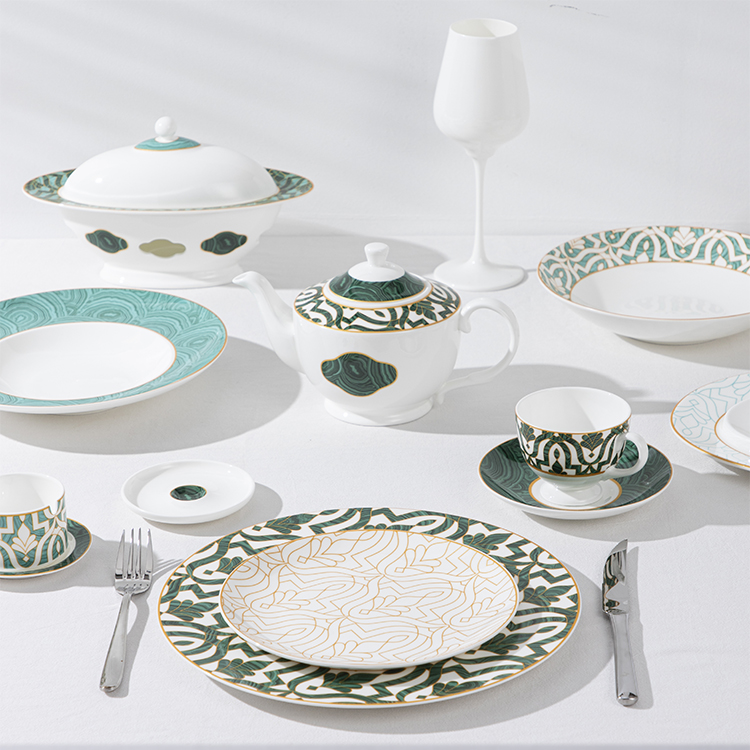
A. Personalización de la vajilla
Comprometerse con fabricantes de vajilla para diseños o logotipos personalizados en la vajilla puede resaltar la individualidad y la exclusividad de la marca. Puede crear una experiencia gastronómica única que los invitados asocian con su establecimiento.
B. Monograma y marca
Incorporando detalles personalizados, como la monograma o la marca, en la vajilla fortalece el reconocimiento y la memorabilidad de la marca. Permite a los huéspedes conectar la experiencia gastronómica con su marca., Creando una impresión duradera.
Pruebas y muestreo

Solicitar muestras de proveedores para evaluación de calidad es crucial antes de tomar una decisión final sobre la vajilla. Realizar pruebas exhaustivas en escenarios de la vida real puede ayudar a garantizar que la vajilla elegida cumpla con las expectativas y funcione bien en el restaurante o en el entorno de hotel.
Asegurar la consistencia y las opciones de reemplazo
Establecer relaciones con Proveedores y fabricantes de vajilla confiable es esencial para garantizar la consistencia de la vajilla. También es importante desarrollar un plan de contingencia para reemplazos o adiciones a la vajilla para evitar cualquier interrupción en la operación del restaurante o hotel..
Conclusión
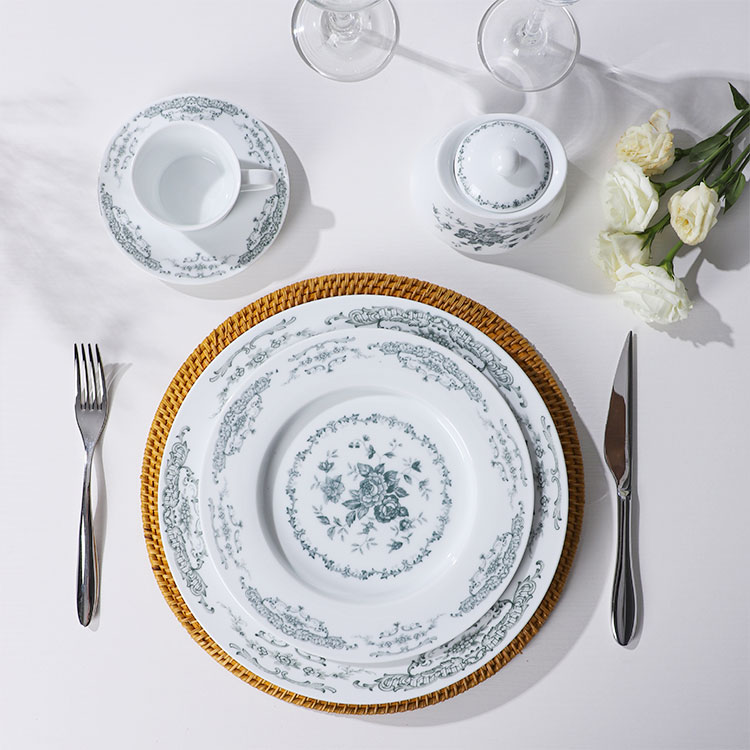
En conclusión, Elegir la vajilla adecuada para su restaurante u hotel es una decisión que no debe tomarse a la ligera. Considerando varios factores como la marca y el estilo, durabilidad y longevidad, Tipos de vajillas, colores y patrones, tamaños y formas, etc., Puede seleccionar con confianza la vajilla que mejorará la experiencia gastronómica general., presentación, y ambiente de tu establecimiento.


